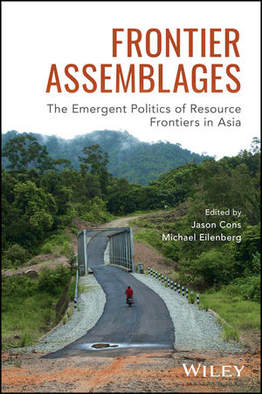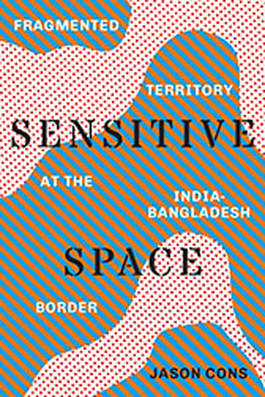Home
Welcome to my website. I am an Associate Professor of Anthropology at the University of Texas, Austin. I work on a range of issues related to frontiers, climate change, and environmental and agrarian change. My next book, Delta Futures: Time, Territory, and Capture on a Climate Frontier is forthcoming from University of California Press in 2025. Stay tuned!
I an editor of South Asia: The Jouranl of South Asian Studies and part of the Limn Editorial Collective
To learn more about my work, see my current publications, or explore my books below.
You can also reach me here:
https://utexas.academia.edu/JasonCons
I an editor of South Asia: The Jouranl of South Asian Studies and part of the Limn Editorial Collective
To learn more about my work, see my current publications, or explore my books below.
You can also reach me here:
https://utexas.academia.edu/JasonCons

The volume Frontier Assemblages: The Emergent Politics of Resource Frontiers in Asia, which I co-edited with Michael Eilenberg will by published by Wiley in early 2019 as part of the Antipode Book Series.
Book Description: Frontier Assemblages offers a new framework for thinking about resource frontiers in Asia. Frontier assemblages are the intertwined cultural, spatial, material, ecological, and political economic processes that produce particular places as resource frontiers at particular moments in time. Contributors offer rich ethnographic and historical studies of both spaces of extraction and production, mapping a set of radical transformations unfolding across Asia. In doing so, they collectively formulate new ways to think about how resource frontiers are made, their implications for those who live and work within them, and their rippling consequences across space and time.
Frontier Assemblages brings together noted anthropologists, geographers and sociologists to rethink a set of processes that are reconfiguring millions of people’s relationship to land. In doing so, it opens a set of new conversations about resource frontiers and their relationship to pasts, presents, and futures of economy, ecology, and life in the margins of Asia.
Written for scholars of human geography, political ecology, political and environmental anthropology and more, Frontier Assemblages maps the flows, frictions, interests, materialities and imaginations that accumulate in frontier spaces to transformative effect.
Book Description: Frontier Assemblages offers a new framework for thinking about resource frontiers in Asia. Frontier assemblages are the intertwined cultural, spatial, material, ecological, and political economic processes that produce particular places as resource frontiers at particular moments in time. Contributors offer rich ethnographic and historical studies of both spaces of extraction and production, mapping a set of radical transformations unfolding across Asia. In doing so, they collectively formulate new ways to think about how resource frontiers are made, their implications for those who live and work within them, and their rippling consequences across space and time.
Frontier Assemblages brings together noted anthropologists, geographers and sociologists to rethink a set of processes that are reconfiguring millions of people’s relationship to land. In doing so, it opens a set of new conversations about resource frontiers and their relationship to pasts, presents, and futures of economy, ecology, and life in the margins of Asia.
Written for scholars of human geography, political ecology, political and environmental anthropology and more, Frontier Assemblages maps the flows, frictions, interests, materialities and imaginations that accumulate in frontier spaces to transformative effect.
|
My book Sensitive Space: Fragmented Territory at the India-Bangladesh Border was published by University of Washington Press in 2016.
Book Description: Enclaves along the India-Bangladesh border have posed conceptual and pragmatic challenges to both states since Partition in 1947. These pieces of India inside of Bangladesh, and vice versa, are spaces in which national security, belonging, and control are shown in sharp relief. Through ethnographic and historical analysis, Jason Cons argues that these spaces are key locations for rethinking the production of territory in South Asia today. Sensitive Space examines the ways that these areas mark a range of anxieties over territory, land, and national survival and lead us to consider why certain places emerge as contentious, and often violent, spaces at the margins of nation and state. Offering lessons for the study of enclaves, lines of control, restricted areas, gray spaces, and other geographic anomalies, Sensitive Space develops frameworks for understanding the persistent confusions of land, community, and belonging in border zones. It further provides ways to think past the categories of sovereignty and identity to reimagine territory in South Asia and beyond. "A distinctive and imaginative account of the peculiar and often mystified enclaves or 'fragmented territories' on the border between India and Bangladesh. . . . Cons offers a rich and nuanced ethnography of multiple dimensions of everyday struggles, contestations, and opportunities in Dahagram. . . . Sensitive Space opens new conceptual avenues for analyses on the Indo-Bangladeshi border as well as border studies more generally." -Prithvi Hirani, Antipode: A Radical Journal of Geography "Cons . . . allows his rich ethnographic material to reveal the complexities of postcolonial sovereignty, insecurity, and precarity. The result is a highly readable, theoretically acute, and sharply insightful work." -Sankaran Krishna, Journal of Asian Studies |

